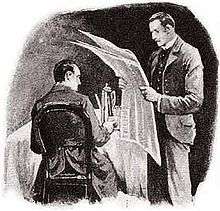The Five Orange Pips
| "The Five Orange Pips" | |
|---|---|
|
1891 illustration by Sidney Paget | |
| Author | Arthur Conan Doyle |
| Series | The Adventures of Sherlock Holmes |
| Publication date | 1891 |
"The Five Orange Pips", one of the 56 short Sherlock Holmes stories written by British author Sir Arthur Conan Doyle, is the fifth of the twelve stories in The Adventures of Sherlock Holmes.
The story was first published in The Strand Magazine in November 1891. Conan Doyle later ranked the story seventh in a list of his twelve favourite Sherlock Holmes stories.[1] This is also one of only two Sherlock Holmes short stories where Holmes' client dies after seeking his help. The other is "The Dancing Men".
Synopsis
A young Sussex gentleman named John Openshaw has a strange story: in 1869 his uncle Elias Openshaw had suddenly come back to England to settle on an estate at Horsham, West Sussex after living for years in the United States as a planter in Florida and serving as a Colonel in the Confederate Army.
Not being married, Elias had allowed his nephew to stay at his estate. Strange incidents have occurred; one is that although John could go anywhere in the house, he could never enter a locked room containing his uncle's trunks. Another peculiarity was that in March 1883 a letter postmarked Pondicherry, in India, arrived for the Colonel inscribed only "KKK" with five orange pips (seeds) enclosed.
More strange things happened: Papers from the locked room were burnt and a will was drawn up leaving the estate to John Openshaw. The Colonel's behaviour became bizarre. He would either lock himself in his room and drink or he would go shouting forth in a drunken sally with a pistol in his hand. On 2 May 1883 he was found dead in a garden pool.
On 4 January 1885 Elias's brother Joseph received a letter postmarked Dundee with the initials "KKK" and instructions to leave "the papers" on the sundial. Despite his son's urging, Joseph Openshaw refused to call the police. Three days later, Joseph Openshaw was found dead in a chalk-pit. The only clue John Openshaw can furnish Holmes is a page from his uncle's diary marked March 1869 in which orange pips have been sent to three men, of whom two fled and the third has been "visited."
Holmes advises Openshaw to leave the diary page with a note telling of the destruction of the Colonel's papers on the garden sundial. After Openshaw leaves, Holmes deduces from the time that has passed between the letter mailings and the deaths of Elias and his brother that the writer is on a sailing ship.
Holmes also recognises the "KKK" as Ku Klux Klan, an anti-Reconstruction group in the South, until its sudden collapse in March 1869 – and theorises that this collapse was the result of the Colonel's maliciously taking their papers away to England.
The next day there is a newspaper account that the body of Openshaw has been found in the River Thames and the death is believed to be an accident. Holmes checks sailing records of ships who were at both Pondicherry in January/February 1883 and at Dundee in January 1885 and recognises a Georgia sloop named The Lone Star. Lone Star may refer to the Lone Star State, Texas, although the boat is registered to Georgia. Furthermore, Holmes confirms that The Lone Star had docked in London a week before.
Holmes sends five orange pips to the captain of The Lone Star, and then sends a telegram to the Savannah police claiming that the captain and two mates are wanted for murder. The Lone Star never arrives in Savannah, due to a severe gale. The only trace of the boat is a ship's sternpost marked "LS" sighted in the North Atlantic.
Other media
The 1945 film Sherlock Holmes and the House of Fear is partly based on "The Five Orange Pips".
The November 2014 episode of Elementary titled "The Five Orange Pipz" takes some story elements from this short story. The unusual "Pipz" spelling is the trademarked name of a fictional bead toy where a manufacturing error rendered the orange beads poisonous when ingested by children.
The third episode of the 2010 BBC Sherlock series titled The Great Game made reference to five pips being sent by an assassin organization as a warning. In the episode, these pips were five electronic beeps, like the pips broadcast immediately before the start of the hour on BBC radio stations.
The Sherlock 2016 Special The Abominable Bride also refers to the original short story, as a murder victim is mailed five orange pips as a threat before being killed. There is also a secret organisation—similar to the KKK only in its hooded costumes—related to the case in the episode.
References
- ↑ "Trivia on Sir Arthur Conan Doyle's Favorite Sherlock Holmes Stories l Trivia Library". Archived from the original on 18 February 2012. Retrieved 18 March 2015.
Sources
- Doyle, Sir Arthur Conan, The Adventures of Sherlock Holmes, Penguin Popular Classics, 1994, page 108.
External links
 The full text of The Five Orange Pips at Wikisource
The full text of The Five Orange Pips at Wikisource Media related to The Five Orange Pips at Wikimedia Commons
Media related to The Five Orange Pips at Wikimedia Commons-
 The Five Orange Pips public domain audiobook at LibriVox
The Five Orange Pips public domain audiobook at LibriVox
